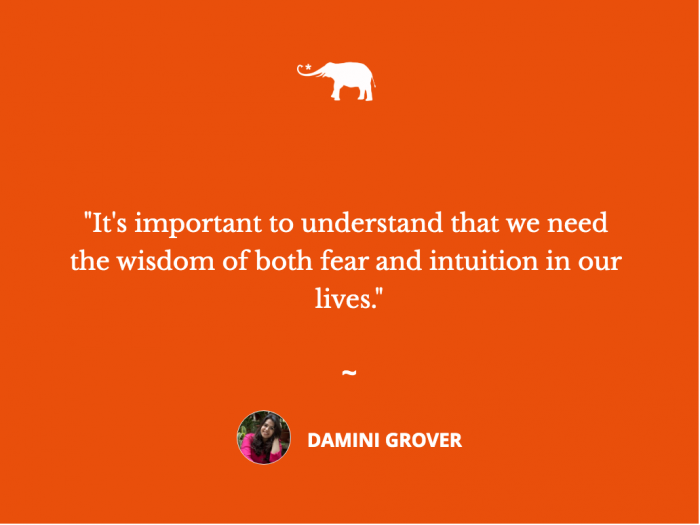
“Intuition is a sense of knowing how to act spontaneously without needing to know why.” ~ Sylvia Clare
Just when I was about to take a leap of faith, I was pulled back. Just when I was convinced that I had found a way forward, something stopped me.
It was a loud, nagging voice that kept telling me to back off and not take that risk because such risks had never worked out well for me before.
That voice filled me with anxiety and dread and slowly eroded; that little voice within me kept saying, “But I know this is right for me!”
Before I realized, I was completely submerged in this battle of what I know I need to do versus not doing it because it may not work out.
Has this ever happened to you?
Have you found yourself in this battle with your own self, where one part of you wants you to do something without an apparent, logical reason and the other keeps pulling you back by filling you with dread?
A lot of times, we get lost in our voices—especially the one that is the loudest, the one filled with fear that completely drowns out the little and extremely powerful voice of intuition.
Repeated experiences with fear can take away our ability to tune into our intuition—the voice within that is our guiding light—and over time we tend to lose the ability to even differentiate between the two.
Then fear becomes our only guide or perhaps the only force that begins to hold us back from everything while keeping us in this illusion that we are moving forward.
So then how do we learn to distinguish between fear and intuition?
And more importantly, how do we tune into our intuition?
Over time, this is what I have come to understand about the two:
1. Our fear will always stop us from taking that step forward, based on the principle of threat protection. Fear stems from past psychological hurts and traumas and uses them as a reference point for every new, uncertain, or unclear situation whereas intuition emanates from the principle of learning and growth. Our subconscious uses past events and incidents and combines them with the deeper awareness of our highest good and presents that awareness with a sense of centeredness.
2. Fear will always fill us up with dread, anxiety, and the possibility of everything that can go wrong in the future. Intuition fills us with calmness. It grounds us gently into the present and gives us a confident insight into what’s good for us.
3. Fear always has us grappling with the “I don’t know” what’s going to happen in life scenarios whereas intuition simply knows. It’s our inner wisdom that already knows where we need to go.
4. Fear pulls us back. It restricts us with a vehement force whereas intuition makes us feel expansive and shows us a well-lit path. It simply flows.
5. Fear is all about saying no and intuition is all about saying yes. Every time we say no to something that we’re afraid of, we feel relieved. But when we say no to something that we know is good for us, we will always be restless and uncomfortable till we find our way back to it—till we come home to ourselves.
6. Fear is always emotionally charged. And intuition, well, it communicates in a few words.
“Intuition is the supra-logic that cuts out all the routine processes of thought and leaps straight from the problem to the answer.” ~ Robert Graves
As I write this, my mind is constantly going back to the time when I had decided to go to London for my Master’s (something that I wrote extensively about in my book The Intentional Being). After a lot of hard work, I got admission in a prestigious university in London.
While it was something that I should’ve celebrated with gusto, I couldn’t. I had this tiny voice inside of me telling me that I shouldn’t go. I had this weird sensation in the pit of my stomach that would crop up the minute someone asked me if I was excited about it.
I wasn’t excited, and I didn’t know why. All I knew was that this extremely logical decision wasn’t sitting well with me. Something inside kept telling me that it wasn’t meant for me. Even though everything about the course made sense, it was a logically flawless decision—something did seem off.
It was only after I reached there and began my course that it became clear to me that I wasn’t cut out for it and that voice inside was right all along. I simply couldn’t understand it.
After a lot of struggle, I did drop out. And it has been one of the best decisions I’ve made till now.
However, this induced a sense of failure within me, and every time I found myself on the verge of taking a big decision, I was gripped by my fear of not being able to do it.
But I am glad that I went through this experience because it taught me that the voice of my intuition sounds like a clear, grounded sense of knowing and gave me a chance to come face-to-face with my fears and how they show up.
And I value both.
It’s important to understand that we need the wisdom of both fear and intuition in our lives. We need to learn to be cautious of what could harm us, but we also need to flow with what we innately know is meant for us.
While fear may have its numerous logics and reasons for not letting us do something, intuition doesn’t need a list of reasons. It’s reason enough.
“Intuition speaks from silence.” ~ Belite and Lundstrom
As we grow mature and become more self-aware, we learn to listen to these distinct voices within us and choose the one that we need to pay attention to at a given point in time.
We need the wisdom of both, and to tune into our intuition, all we need to really understand is that “the deeper we go, the higher we rise.”
And it all happens within.
 Share on bsky
Share on bsky






Read 50 comments and reply